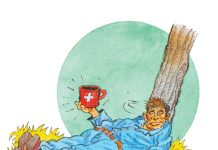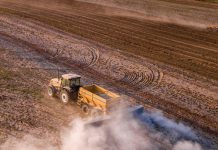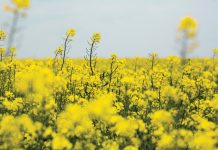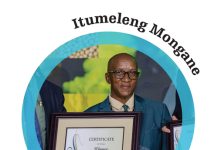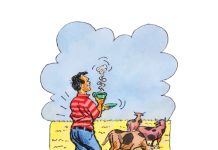 One of the finalists in the Potential Commercial Farmer of the Year category of Grain SA’s Farmer of the Year competition, is Tamsanqa Raphael Masuku (74). He farms with his wife, Nonhlahla (72), on their own farm, Kwagga’s Drift, near Newcastle in KwaZulu-Natal. After they resigned as teachers in 2001 they became full-time farmers, dreaming of becoming fully fledged commercial farmers. ‘We have always had a passion for farming.’
One of the finalists in the Potential Commercial Farmer of the Year category of Grain SA’s Farmer of the Year competition, is Tamsanqa Raphael Masuku (74). He farms with his wife, Nonhlahla (72), on their own farm, Kwagga’s Drift, near Newcastle in KwaZulu-Natal. After they resigned as teachers in 2001 they became full-time farmers, dreaming of becoming fully fledged commercial farmers. ‘We have always had a passion for farming.’
Part-time passion becomes full-time career
Tamsanqa studied at the University of Zululand where he obtained a BA degree in 1979 and completed his BEd degree in 1981. Nonhlahla is also a qualified teacher and they started farming together while they were still teachers. ‘We were full-time teachers and part-time farmers,’ says Nonhlahla and adds: ‘We had cattle and a dairy and sold milk to the community.’ Tamsanqa later became a school principal before joining the KwaGqikazi College of Education in 1987.
The couple is blessed with four children – three sons and a daughter. One of their sons, Andile, is very interested in farming and takes leave every season from his job at Foresight Consulting to assist them on the farm with the ploughing and planting. ‘Our other children are all working and when we need anything, they help with the finances as we didn’t get a loan,’ says proud mother Nonhlanhla.
Kwagga’s Drift is a 1 096-ha farm in the Amajuba district with 300 ha of arable land and 796 ha being used for grazing. This year they planted a total of 300 ha of maize and although the excess rain was challenging, they are hopeful for a good harvest. They also planted 45 ha of soybeans.
Expertise changed it all
The couple joined Grain SA in 2019 and have seen a vast improvement in their maize production since mentor Chris de Jager and regional development manager Graeme Engelbrecht have been guiding them. ‘Before joining Grain SA our maize production was dwindling. They made a huge difference in our operation,’ says Nonhlahla enthusiastically. ‘We had very little knowledge about soil conservation, seed selection and the use of chemicals.’
Through study group involvement and Grain SA’s mentorship, these two enthusiastic farmers soon learned about the importance of knowing your soil to ensure successful crop production. They have already attended two courses presented by Grain SA and plan on expanding their knowledge in the future by attending more. As they wish to leave the farm in a better condition than they found it, soil conservation practices like weed control and fertiliser management have become increasingly important to them. They are working hard to improve their agricultural practices and their produce.
Where they initially attempted to do it all on their own and only harvested 1 t/ha, Grain SA’s assistance and their dedication have seen their yield increase to 4 t/ha last season. ‘Although this isn’t very high, it is very good for the poor soils in our area,’ says Tamsanqa and adds that the fundamental increase in their yield is thanks to Grain SA’s input. ‘What we are doing is making a difference. We now see ourselves as serious contributors to food security in South Africa.’
Nonhlahla is especially proud of being part of the agricultural sector which has played a vital part in the country’s growth through the COVID-19 pandemic. ‘To think that we were part of the sector that showed positive growth during the pandemic, is very satisfying,’ adds Nonhlahla.
They are extremely proud to have been nominated in Grain SA’s Farmer of the Year competition and beyond excited to have been chosen as finalists in the Potential Commercial Farmer category. ‘We are very, very proud,’ says Tamsanqa who is also the chairperson of the Amajuba District Farmers Association.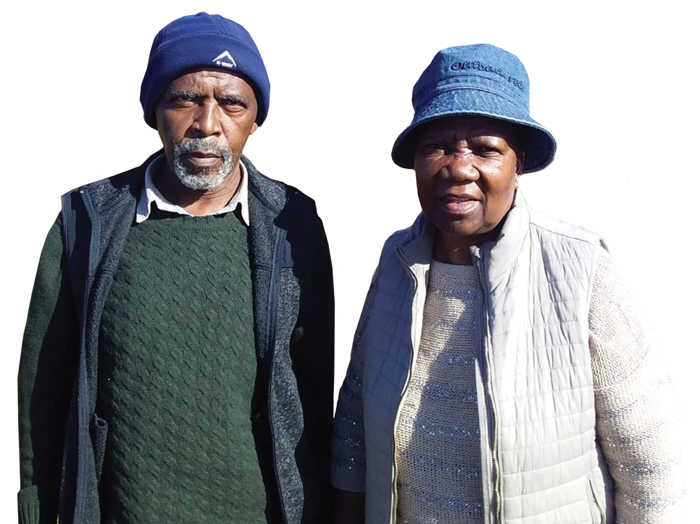
Teamwork lets their dream work
Nonhlahla says that her husband is a dedicated farmer who perseveres no matter which stumbling blocks the road ahead may present. ‘He is a good farmer because if he wants to do something, he will do it. Although it may go slowly, he will always reach his goal. He likes to change with time – that’s the guy I like.’
Some of the challenges that are slowing down their progress and expansion are a shortage of resources, theft and problems with mechanisation. Currently they use equipment provided by the government. The equipment is very old and not in a good condition. ‘If the department decides to take it away, we can do nothing,’ says Tamsanqa. That is why they have invested in some second-hand implements. ‘We hope to finish paying it after the harvest this year.’
Although they are already in their seventies, this ‘dream team’ still have plans to expand their farming operation, increase their maize production and get more cows in the future. They would also like to own bigger tractors and other equipment to make their production easier.
Their wish for South African agriculture is that the government will be truly committed to assist all farmers. ‘We hope and pray that people will realise that we need to do intensive agriculture. If the government can support the farming sector, farmers can farm. They should think of the farmers first, because without farmers there will be no food and without food there will be no people.’




